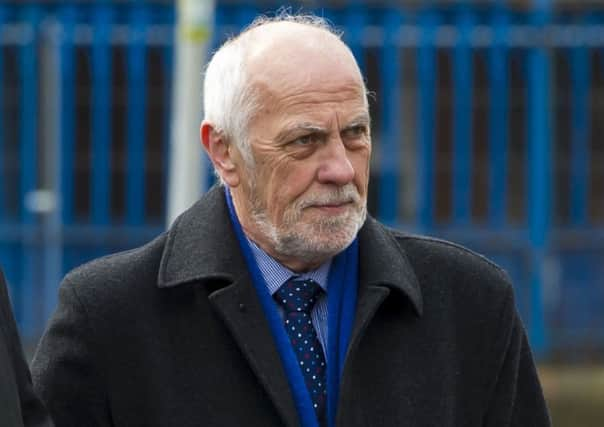Obituary: Colin McDonald Jackson, footballer


Colin Jackson, who has died following a lengthy and courageous battle with leukaemia, was probably a better footballer than he is given credit for.
However, as has been shown on various football supporters’ websites, since his death, those Rangers supporters who saw him play for the club appreciated the old-fashioned Rangers values he brought to the team.
Advertisement
Hide AdAdvertisement
Hide AdThe Rangers Way was always about having a solid defensive structure; the cavalier attacking football of Hibs’ Famous Five for instance, contrasted with Rangers’ Iron Curtain defence. This need for defensive solidarity was drummed into young Ibrox defenders such as Jackson, so that, when the first team chance beckoned, they knew their jobs.
Learning the ropes back when he joined the Glasgow club from Aberdeen Sunnybank meant a lengthy apprenticeship too. Jackson arrived at the club full-time in July 1963, but he didn’t make his first-team debut until 1 January, 1966, when blooded against Partick Thistle in a 4-0 win.
He would play a mere 17 games over the remainder of the 1960s, mostly as a stand-in for the great Ronnie McKinnon, before, in season 1970-71, he became a regular, forming a solid central defensive partnership with the aforesaid McKinnon, whom he eventually displaced as the club’s starting centre-half.
Jackson, known to the fans as “Bomber”, was a first-pick from that 1970-71 season right through until his final Rangers’ appearance in the 1982 Scottish Cup Final, in all, making more than 500 appearances for the club, before winding-down his career with a season at Partick Thistle, book-ended by two short spells at Morton.
There was nothing flashy about Jackson in action. He perhaps personified the dictum of Yorkshire footballer-turned-comedian Charlie Williams, who famously said: “I weren’t much of a player, but I could stop them as were.”
Jackson was a better player than Williams, and, more sophisticated when it came to stopping better players than he was. He was strong in the air, firm in the tackle and able to get the ball away to those who could do more with it.
In some ways he was a McKinnon Mark II, under-rated, taking a little while to establish himself and though he didn’t win as many Scotland caps as his predecessor, Jackson’s eight full caps – he also won under-23 honours and played for the Scottish League XI – he can claim an unbeaten international record: played eight, won five, drew three. All his caps were won within a 13-month period, but they included the first game after the “Copenhagen Affair” in 1975, when John Greig was brought back as skipper after Billy Bremner’s indiscretions in the Danish capital, while Jackson was an ever-present during Scotland’s 1976 Home International campaign, when the three wins, culminating in the 2-1 Hampden victory over England, in which Kenny Dalglish “nutmegged” Ray Clemence, started to convince the Tartan Army that we could lift the World Cup in 1978.
He scored one international goal, his second-half header against Wales in Cardiff in 1975, helping turn a 0-2 half-time deficit into a 2-2 draw.
Advertisement
Hide AdAdvertisement
Hide AdAt club level, his honours included three Scottish League Championship medals, three Scottish Cup winner’s medals and five League Cup winner’s medals, the 1978-79 one particularly precious, since it was his last-minute goal which saw off Aberdeen in the final.
He was a member of both of Jock Wallace’s treble-winning squads, but injury kept Jackson out of the 1972 European Cup-Winners’ Cup final against Dynamo Moscow, which Rangers famously won to lift the club’s only European trophy. Jackson may have played his last senior football in colours other than Rangers’ but he remained committed to the club he had served for 20 years.
On hanging up his boots, he developed a very successful business career in the printing industry. He then returned to Ibrox as a match-day host, forging an off-field partnership with Jimmy Millar in the corporate boxes every bit as successful as his on-field ones with the likes of McKinnon, Greig, Davie Smith, Derek Johnstone and Tam Forsyth had been.
But, he gave too, to those former Rangers players who had not had his abilities and good fortune to thrive in the world of business. With Greig, Sandy Jardine and Peter McCloy, he started and managed the Former Rangers Players Benevolent Fund, helping to ease the later lives of those who had served the club.
For this, as much as for his 500-plus games, he was inducted into the Rangers Hall of Fame.
He was, in some ways, the last of a line. Davie Meiklejohn, Jimmy Simpson, Willie Woodburn, George Young, Ronnie McKinnon and Jackson all played centre-half for Rangers; all came up through the ranks. They were, in that phrase applied so often during the club’s recent travails: “Real Rangers Men.”
During the post-Woodburn/Young phase, John Valentine, Willie Telfer, Bill Paterson and Doug Baillie were bought by Rangers to fill the number five shirt. Since the Souness/Murray big-money Rangers revolution, this continued, with the purchases of Terry Butcher, Richard Gough, Alexei Kuznetsov, Colin Hendry, Lorenzo Amoruso etc.
But can Rangers fans honestly say any of these purchases gave the club more than Colin Jackson did?
Advertisement
Hide AdAdvertisement
Hide AdHe is survived by his wife, Pam, daughter, Victoria, and son, Christopher. At the request of the family, Colin Jackson will have a private funeral, although it is hoped there will be a memorial service at a later date.